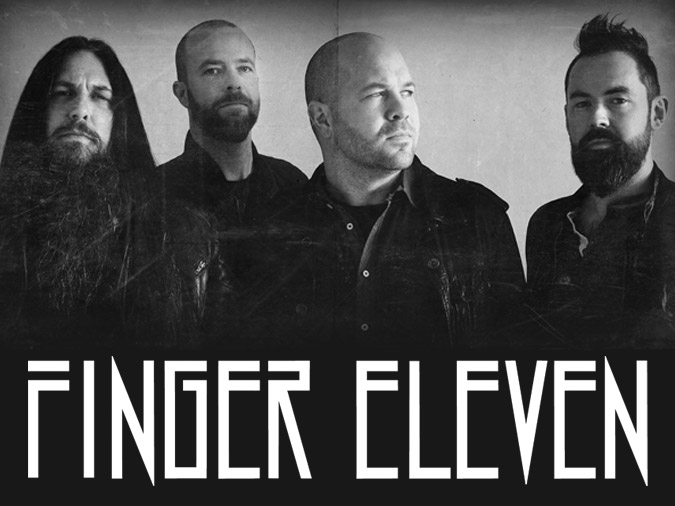
Finger Eleven - 2015
- Scott Anderson - lead vocals
- James Black - lead guitar, background vocals
- Rick Jackett - rhythm guitar
- Sean Anderson - bass
fingereleven.com
When Ontario, Canada rockers Finger Eleven decided to start writing the follow-up to their 2010 album Life Turns Electric, the band members all agreed they wanted to do something different, they just weren’t exactly sure what they wanted to do. Since their formation in high school in 1990 (as Rainbow Butt Monkeys), the musicians, Scott Anderson (vocals), James Black (guitar), Rick Jackett (guitar) and Sean Anderson (bass) had released six full-length albums – including the Juno-Award winning Them Vs. You Vs. Me -- and experimented with a variety of styles such as hard rock, classic rock, heavy blues and textural pop. So, over a two-and-a-half year period, they decided to try a bit of everything over a multitude of writing sessions.
“We went through so many different styles and vibes musically, says guitarist Rick Jackett. “We’d write three or four songs and we’d be happy with one of them. Every time we’d write a new batch, we’d have one song that would be cooler than the rest and that would raise the bar. By the time we were ready to record, we had a killer batch of songs to choose from.”
As the members pored through the material they had written, they agreed that the best songs, the ones that rang truest and were the most natural, were the more aggressive ones. So, instead of spit-polishing the mixes and layering the tunes with heart-rending guitar arpeggios and keys, they toughened up, building muscular walls of riffs and performing with a forcefulness and energy reminiscent of their earliest days.
“When we started the band, we just wanted to blow everyone away with force and power and MAKE them take notice of us,” says guitarist James Black. “We wanted this record to be that same kind of punch in the face. On our past couple albums, we’ve taken full advantage of the ‘studio’. We’ve had songs with hundreds of tracks, some with forty tracks of guitar alone. This time, we wanted to keep the songs so raw they sounded like they do in the rehearsal room.”
In addition to capturing a primal, authentic feel, Five Crooked Lines incorporates the band’s earliest influences and recontextualizes them in an explosive modern framework. “Absolute Truth” features a turbulent rhythm that tumbles through a vortex of quasi-psychedelic guitars, “Blackout Song” is a feast of fuzzy, wailing riffs, four-to-the-floor beats and euphoric hooks and the title track exits the gate with crashing symbols, a buzzing passage and a counter-melody that keeps the music pumping. From one song to the next, there are no compromises, no concessions and nothing tailor-crafted to suit any outside demands. There’s even a seven-minute song, “Come On, Oblivion,” a transcendent ebb-and-flow mélange of trippy acoustic and electric instrumentation that’s as reminiscent of early The Verve as it is of Pink Floyd.
Immediate, urgent and unfiltered, Five Crooked Lines expresses the exultant spirit of rock and roll, not the anger and fury of a generation of misfits. “That’s just not us anymore if it ever was,” vocalist Scott Anderson says. “I can’t keep pretending to be a teenager. So instead, I channeled my adrenaline to create aggressive sounding vocals. Take a song like ‘Gods of Speed.’ That’s about going fast and the excitement that’s generated in that environment.”
The band chose the album title after they realized that Anderson’s lyrics to the titular song had a universal appeal and a particular relevance to the album. “For me it’s symbolic of fortune and luck and how fragile those things are,” Anderson says. “In one instance you’ve got five crooked lines, which in one position is just a heap of bent sticks. But in the right way, they make a star, which is the most glorious shape there is.”
Having endured various trends and industry shifts over the years, Finger Eleven have gotten used to surprises and learned to roll with the punches. Even so, there were times when making Five Crooked Lines seemed like an exercise in futility. “We had a few false starts and a few misfires” say Black “We canned a few sessions. We just knew something wasn’t right yet. We felt ready, we wanted to be ready, but the music just wasn’t there yet.”
In that time the band parted ways with their record label and their drummer, and wound up completely rethinking its musical approach. “What might have been a ‘problem’ was actually the best thing to happen.” Black says. “It created necessity. We had to figure out what to do in order to keep moving forward, so we started using beats from old records, letting the drum parts guide the riffs instead of the other way around. That brought about a brand new way of doing things and a whole new level of inspiration.
The shift in perspective was creatively rewarding and gave Finger Eleven more cohesion than ever. Despite the fact that the members were working separately, sending MP3 files to one another, songs like “Not Going To Be Afraid” and “Absolute Truth” sounded fresh and spontaneous, as if they were written and recorded live.
Lyrically, Anderson wanted his art to reflect the unorthodox creation of the album and the shake-ups Finger Eleven had experienced. He felt somewhat isolated by the absence of previously familiar elements and searched for a support anchor. “I needed a mantra, something to help me feel better,” he says. “That’s when I wrote ‘Not Gonna Be Afraid.’ I really felt like we were out there on our own and that song expressed that.”
Elsewhere, the electric funk-fueled “Wolves and Doors” is a sardonic commentary on the demands of being a songwriter, and how finishing a project generates almost as much anxiety as suffering writer’s block. “There’s a real elation you feel after you’re done writing, but that fades quickly and then you’re like, ‘Oh shit, now I’ve got to do that again,’” Anderson says. “It’s so great and so much fun to create, but it never seems to be enough for anyone, including me. It’s a never-ending process. Even if a song comes out really great and people love it, they’re like, ‘Cool, what’s the next one going to be?’”
When all the songs were ready, Finger Eleven headed down to a home studio in West Nashville where producer Dave Cobb (Rival Sons, Sturgill Simpson, Jason Isbell) helped them narrow the bounty of songs they had written down to 12 and record them at break neck speed. Upon arriving in Music City, USA, there were two things Finger Eleven wanted. First, they needed their record to capture the old-school atmospheres of some of their favorite classic rock records. Secondly, they needed a drummer.
“Instead of finding someone to come down to Nashville with us, we figured we could get a killer drummer there,” explains Jackett. “I mean, Nashville is home to some of the best session players. Dave called up Chris Powell, and within the first three hours of the first day it was happening. We knew right away that his drumming would elevate the entire record.”
Finger Eleven, Cobb and Powell recorded Five Crooked Lines in 11 days and mixed in an additional four, acting, at times, like it was 1985 instead of 2015. For songs like the ripping, lunging “Save Your Breath,” the shuffling garage vibe of “Absolute Truth” and the more reflective “Lost For Words,” the band relied on classic recording techniques, vintage equipment and memories of when they were kids and first discovered rock and roll.
“When we recorded overdubs, we thought, ‘Let’s use a Mellotron because that’s what Sabbath would do.” Jackett says. “Or let’s flip this whole verse and do it backwards cause that’s what the Beatles or Hendrix would do.” adds Black. “We wanted to do our own version of those sounds from those records that we love and not be afraid to wear our influences on our sleeves.”
Some critics and fans frown when musicians tap into a particular era for inspiration, but, having achieved success on their own terms long ago, Finger Eleven don’t care. “I think we’ve always gone against the current,” Black says, “or at least against where we’re ‘logically’ expected to go next. Because we’re all open minded enough to just go for it, we go for it. We end up exploring way outside our own bubble. With Five Crooked Lines I think we went far enough out there to be able to look back and say ‘Fuck it.’ We love big guitar, big beat, loud as fuck rock and roll music. We know how to do this kind of music. Let’s own it.”
“I agree,” concludes Jackett. “We knew we wanted to deliver a real rock record in a fun, refreshing way rather than just making a typical modern rock album. So I guess our attitude was, ‘If we’re gonna make a record, let’s make it fucking bad-ass!”
Camp Moondance 2025 Lineup
MDJ Saloon Stage
The Food Stand Frybread Tacos, Burgers, Hot dogs, Philly’s, Nachos, Desserts
Fried Food Fantasy All fried foods and their award winning Dynamite Dog
Pere’s Smokehouse BBQ Brisket, Pulled pork, Ribs, Chicken, Baked Beans, Smoked Mac & Cheese, Coleslaw
Thursday 3:00pm Corner Bar & Shirt Shack Open!
Let's get this party started!
Friday & Saturday 9am-Noon Breakfast & Bloody Mary/Mimosa Bar
Friday & Saturday 10am-11:30am Moondance Knowledge Bowl - Show how much you know about Moondance!
Friday & Saturday Noon-2:30pm Karaoke on the Saloon Stage
Friday & Saturday 3pm-4:30pm Bingo! Lots of fun prizes!
All Weekend Bags tournament! Signup Thursday afternoon or Friday morning.
Awesome 2025 Merch to celebrate 34 years of Moondance! Along with some awesome prices! Limited garments so get to the Shirt Shack early!
Friday night! Retro!!
Saturday night! The oldest Moondance merch you can find!!
Thursday from 10am-4pm
Friday & Saturday from 8am-4pm
Still need tickets and camping?!!
Call Renee NOW at 218-836-1055.
She’ll take good care of you!!
If it rains, we’ve got you covered!!!
*Schedule and lineup are subject to change without notice.
For up-to-date info, please check back here or follow us on Facebook.














